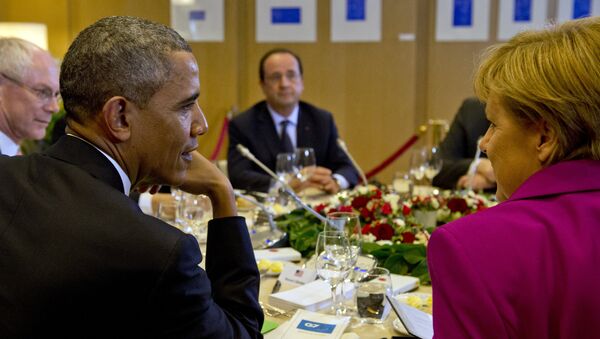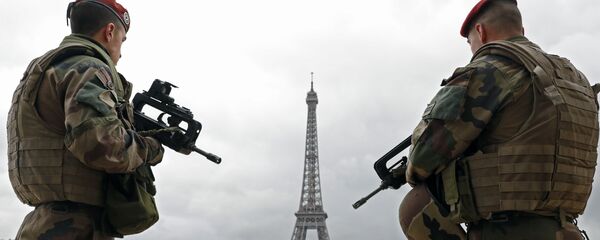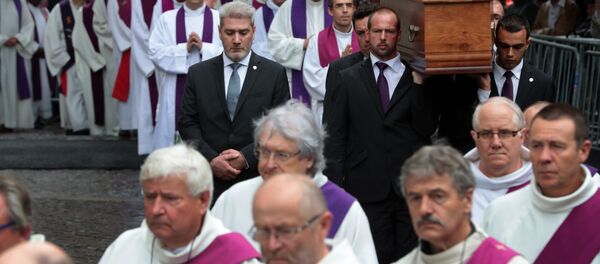In a cutting op-ed, published by Le Figaro, Dupont-Aignan warned that unfortunately, the weakness of the French government's efforts against the terrorist threat are open for everyone to see – not just in France, but around the world as well. The politician suggested that the "good intentions and interests of other 'friendly' powers" are parasitically profiting off of France's foreign policy while the country itself is being led astray.
"How far we are from Gaullist diplomacy, which inspired respect from everyone for its rejection of shameful compromises, its rejection of slavish submission, the logic of power blocs and retreats under the guise of distorted principles!" Dupont-Aignan added.
He noted that Paris is showing an illogical willingness to compromise with "an increasingly Islamist and less and less democratic Turkey, while showing an absurd inflexibility in relations with Russia, which is objectively our best ally against Daesh in the Middle East."
"This line by the president confirms that the so-called democratic values and principles which supposedly underlie our diplomacy are in fact only double standards, only a cover for shameful concessions – of a permanent shameful Munich!" Dupont-Aignan lamented, referring to the infamous Munich Agreement of 1938, signed by British and French leaders with Adolf Hitler in the run-up to the Second World War.
"There is no doubt that both these cases we are sacrificing our most vital interests — the security of our citizens, and the formation of a more stable and balanced international environment, by our unreasonable decisions vis-à-vis our cumbersome partners," the politician complained.
At the same time, the politician noted, the 'savage purge' going on inside Turkey after last month's coup attempt, and Ankara's ambiguous relations toward the Daesh terrorists in both Syria and Libya, "don't seem to be enough to stop negotiations on Turkey's accession to the EU, or a visa-free regime for Turkish citizens to Europe, talks on which are scheduled for October."
"Moreover, we are not able to put proper pressure on the country so that it completely stops all support for the Caliphate, on whose destruction all our efforts must be directed."
"Meanwhile," Dupont-Aignan noted, "the United States is doing everything it can to set Europe and Russia up against each other, out of fear that a mutual rapport between the two would weaken the US position on the continent. This is the very essence of the new Cold War –artificial and reckless, which Washington has quietly declared against Moscow, having retained its obsolete military alliance, NATO, and constantly challenged Russia along its borders (in Ukraine, Georgia, etc.)."
This, the politician laments, has become a reality "despite promises made in the early 1990s not to engage in any struggle for influence in the territories of the former USSR. The fixation by Europe and Paris on the Ukrainian crisis and the annexation of Crimea (which had been Russian land for centures!), as well as the EU's absurd sanctions against Russia – all this is part of this policy, which does not correspond with our interests."
"It's all utter nonsense," the politician suggested, "because only Russia has demonstrated the effectiveness of its commitment against Daesh, unlike the United States, whose dodgy actions have been aimed more at damaging Moscow and Tehran by replacing Assad with Syrian rebels than they have on fighting Islamist terrorism in the Middle East. How else can one look at the ongoing US military assistance to the Syrian opposition, now dominated by factions affiliated with al-Qaeda?!"
Ultimately, Dupont-Aignan noted, "by the cowardly reconciliation with Turkey on the one hand, and the absurd rigidity in relation to Russia on the other, French diplomacy is strangling itself in a permanent servitude to Berlin and Washington. France is in need of a reorientation of its foreign policy, for although it's impossible to say with certainty how to achieve victory in this war, we all understand perfectly well how to lose it."
The French government has hinted that it is looking to soften its position toward Russia, something supported by much of the country's population. Earlier this month, The Wall Street Journal warned that President Hollande has gone "soft on [Vladimir] Putin to improve his chances of election victory" in elections next year.
Last month, speaking on the sidelines of the NATO summit in Warsaw, Hollande had said that "for France, Russia isn't an adversary, isn't a threat." The comment led to criticism from France's NATO allies, including the United States, whose leaders have previously indicated that Russia as much a threat to the West as Daesh and even some epidemic-causing viruses.





